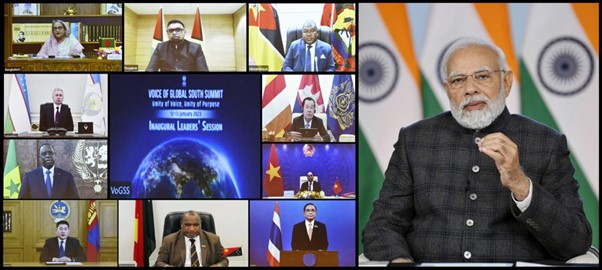nCa Commentary
Prime Minister Modi of India hosted the first Voice of Global South Summit in online format on 12-13 January 2023. There were eight sub-events attached to the main event.
The summit took place while India is the chair of G20, 1 December 2022 to 30 November 2023.
Setting the tone of the summit, PM Modi said countries need to respond to the priorities of the Global South, recognize the principle of common but differentiated responsibilities, respect international law and territorial sovereignty, and reform international institutions including the UN.
His message can be encapsulated as 4Rs – Respond, Recognize, Respect, Reform.
While it would be easy to find similarities between the first Voice of Global South Summit and the South-South dialog of some 50 years ago, the fact is that it is a different world facing different problems and is in need of fresh perspective.
What was set in motion at the summit was the tracing of the outlines of the fresh perspective.
PM Modi said, “We, the Global South, have the largest stakes in the future. Most of the global challenges have not been created by the Global South. But they affect us more.”
The theme of the Inaugural Leaders’ session was “Voice of Global South – for Human-Centric Development” and that of the Concluding Leaders’ session was “Unity of Voice-Unity of Purpose”.
* * *
Describing the event as the new voice on the global arena will not do justice to its significance and potential.
The fact is that what was said at the summit by India and the participants was already in the ether in one form or the other but it had so far been mostly dismissed as the background din, a dull roar.
The summit has consolidated the individual voices as one loud and clear message.
To dilate on this point, we would like to present here the summarized version of the remarks of PM Modi at the closing session of the summit:
The last 3 years have been difficult, especially for us developing nations.
The challenges of the COVID pandemic, rising prices of fuel, fertilizer and foodgrains, and increasing geo-political tensions have impacted our development efforts.
However, the start of a new year is a time for fresh hope. So let me first extend my good wishes to all of you for a happy, healthy, peaceful, secure and successful 2023.
We all appreciate the principle of globalisation. India’s philosophy has always seen the world as one family.
However, developing countries desire a globalization that does not create Climate Crisis or Debt Crisis.
We want a globalisation that does not lead to unequal distribution of vaccines or over-concentrated global supply chains.
We want a globalisation that brings prosperity and well-being to humanity as a whole. In short, we want a ‘human-centric globalisation’.
We developing countries are also concerned about the increasing fragmentation of the international landscape.
These geopolitical tensions distract us from focusing on our development priorities.
They cause sharp swings in international prices of food, fuel, fertilizers and other commodities.
To address this geopolitical fragmentation, we urgently need a fundamental reform of the major international organisations, including the United Nations Security Council and the Bretton Woods institutions.
These reforms should focus on giving voice to the concerns of the developing world, and reflect the realities of the 21st Century.
Mindful of the fact that just one summit would hardly be enough to break the inertia, India has offered to set up several institutions and platforms for the Global South to amalgamate and refine its collective voice.
* * *
A total of 125 countries participated in the initiative. This includes 29 countries from the Caribbean and Latin America, 47 countries from Africa, seven countries from Europe, and 31 countries from Asia.
From Central Asia, President Shavkat Mirziyoyev of Uzbekistan, President Kassym-Jomart Tokayev of Kazakhstan, Deputy Prime Minister Nurmuhammet Amannepesov of Turkmenistan, Chairman of the Committee for environmental protection of Tajikistan Bahodur Sheralizoda took part in the summit.
In addition to the main summit, there were eight ministerial sessions, with the following themes:
- Finance Ministers’ Session on “Financing People-Centric Development”
- Environment Ministers’ Session on “Balancing Growth with Environment-Friendly Lifestyles (LiFE)”
- Foreign Ministers’ Session on “Priorities of the Global South – Ensuring a Conducive Environment”
- Energy Ministers’ Session on “Energy Security and Development- Roadmap to Prosperity”
- Health Ministers’ Session on “Cooperation to Build Resilient Healthcare Systems”
- Education Ministers’ Session on “Human Resource Development and Capacity Building”
- Commerce and Trade Ministers’ Session on “Developing Synergies in the Global South – Trade, Technology, Tourism and Resources”
- Foreign Ministers’ Session on “G-20: Suggestions for India’s Presidency” /// nCa, 16 January 2023
